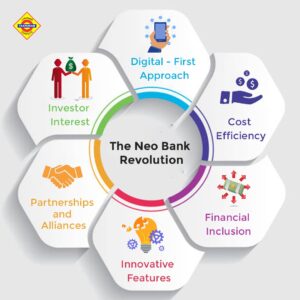
THE RISE OF NEO BANKS
In recent years, Neo Banks have become a buzzword in the financial industry, but what exactly are they, and why should you care? In this blog post, we’ll dive deep into the phenomenon known as Neo Banks, exploring their rise, their impact on the banking sector, and most importantly, the crucial role that auditing and tax services play in ensuring their safety and compliance.
What are Neo Banks?
Neo Banks, often known as “Neoteric Banks” or “New Banks,” are digital-first financial institutions revolutionising how we manage our finances. Unlike traditional banks with physical branches, Neo Banks operate exclusively online, providing a wide array of financial services through mobile apps and websites.
These banks prioritise convenience and user-friendliness, aiming to simplify tasks such as account management, transactions, savings, and loans. For example, a Neo Bank might offer a hassle-free account setup process, intuitive budgeting tools, and instant peer-to-peer money transfers, all accessible at your fingertips. Prominent examples of Neo Banks in India include Paytm Payments Bank, Niyo, and Kotak 811.
The Neo Bank Revolution:

The Neo Bank revolution has been nothing short of a financial game-changer in India. Several factors have contributed to the meteoric rise of Neo Banks and their growing influence in the banking sector.
-
Digital-First Approach:
Neo Banks are inherently digital, offering a seamless and user-friendly experience through mobile apps and websites. This approach resonates with a tech-savvy generation that values convenience and accessibility.
-
Cost Efficiency:
Neo Banks operate with significantly lower overhead costs compared to traditional banks with physical branches. This cost efficiency often translates into lower fees and better interest rates for customers.
-
Financial Inclusion:
Neo Banks are instrumental in promoting financial inclusion. They provide services to individuals and businesses that may have been underserved or excluded by traditional banks due to geographical constraints or limited credit history.
-
Innovative Features:
Neo Banks are at the forefront of innovation. They constantly introduce new features and tools, such as AI-powered financial advice, real-time expense tracking, and instant peer-to-peer payments, enhancing the overall banking experience.
-
Partnerships and Alliances:
Many Neo Banks form strategic alliances with fintech companies, offering a broader spectrum of financial products and services. These partnerships enable customers to access loans, insurance, and investment options seamlessly.
-
Investor Interest:
Neo Banks have piqued the interest of investors, leading to substantial funding rounds. This financial backing fuels their growth and allows them to expand their offerings and customer base rapidly.
Neo Banks vs. Traditional Banks:
Neo Banks and traditional banks represent two contrasting approaches to banking in the digital age. Let’s delve into the key distinctions between these financial institutions to understand why Neo Banks are causing a paradigm shift.
| Aspect | Neo Banks | Traditional Banks |
| Operational Model | Operate exclusively online, without physical branches. | Have physical branches and a strong offline presence. |
| Customer Experience | Prioritise digital convenience, offering user-friendly mobile apps and websites. | Offer both in-person and online services, with a potentially less streamlined digital experience. |
| Cost Structure | Benefit from a leaner cost structure, often resulting in lower fees and competitive interest rates. | Incur higher operational costs, which can translate to higher fees for customers. |
| Financial Inclusion | Instrumental in promoting financial inclusion. | May have stricter requirements and potentially limited efforts in financial inclusion. |
Advantages of Neo Banks:
Neo Banks have swiftly risen to prominence in the financial sector, and for good reason. They offer several key advantages that cater to the evolving needs and preferences of consumers and businesses:
-
Digital Convenience:
Neo Banks operate exclusively online, providing customers with 24/7 access to their accounts through user-friendly mobile apps and websites. This level of digital convenience resonates with the modern, tech-savvy generation.
-
Lower Fees:
Thanks to their lean cost structures, Neo Banks often offer lower fees and competitive interest rates. This can translate into cost savings for customers, making banking more affordable.
-
Financial Inclusion:
Neo Banks are instrumental in promoting financial inclusion. They extend their services to individuals and businesses that may have been underserved or excluded by traditional banks due to geographical constraints or limited credit history.
-
Innovation:
Neo Banks are at the forefront of innovation, constantly introducing new features and tools. These may include AI-powered financial advice, real-time expense tracking, and instant peer-to-peer money transfers, enhancing the overall banking experience.
-
Partnerships and Alliances:
Many Neo Banks form strategic alliances with fintech companies, offering a broader spectrum of financial products and services. These partnerships enable customers to access loans, insurance, and investment options seamlessly.
-
Investor Interest:
Neo Banks have garnered significant investor interest, leading to substantial funding rounds. This financial backing fuels their growth and allows them to expand their offerings and customer base rapidly.
Disadvantages of Neo Banks:
While Neo Banks offer numerous advantages, they are not without their challenges and drawbacks. It’s essential to consider these factors when choosing your banking provider:
-
Limited Physical Presence:
Neo Banks lack physical branches, which can be a disadvantage for customers who prefer in-person banking services or need access to physical locations for specific transactions.
-
Security Concerns:
Operating exclusively in the digital realm exposes Neo Banks to cybersecurity threats. Although they invest heavily in security measures, customers may have concerns about data breaches and fraud.
-
Regulatory Compliance:
Neo Banks must navigate complex regulatory landscapes, and compliance can be a challenging and resource-intensive process. Non-compliance can lead to legal and financial repercussions.
-
Less Diverse Product Offerings:
Traditional banks typically offer a wider range of financial products and services, such as mortgages, wealth management, and business banking, which Neo Banks may not provide.
-
Dependence on Technology:
Neo Banks heavily rely on technology, which means that technical glitches or outages can disrupt banking services. Customers may experience inconvenience during such disruptions.
-
Risk of Rapid Expansion:
Neo Banks often grow rapidly to capture market share. While this can be positive, it also carries the risk of operational challenges if not managed effectively.
Tax Considerations for Neo Bank Users:
If you’re considering using or are already using a Neo Bank, it’s essential to be aware of the tax implications that can affect your financial transactions and overall financial well-being.
1.Interest Income:
Neo Banks offer savings and fixed deposit accounts, and the interest earned on these accounts is considered taxable income. It’s crucial to report this income accurately when filing your annual tax returns to ensure compliance with Indian tax laws.
2. Withholding Tax:
If you engage in cross-border transactions or investments through your Neo Bank account, you may be subject to withholding tax on certain payments. Understanding and complying with withholding tax regulations is vital to avoid unexpected tax deductions.
3. Reporting Foreign Accounts:
If you hold foreign bank accounts through a Neo Bank, you must disclose these accounts to tax authorities as per the Foreign Account Tax Compliance Act (FATCA) and other regulations. Failure to do so can result in penalties.
4. Transaction Reporting:
Neo Banks are required to report certain financial transactions to regulatory authorities. It’s important to keep records of your transactions and understand any reporting that may apply to your account.
5. Consultation with Tax Professionals:
Given the evolving nature of tax regulations and the unique aspects of Neo Banks, seeking advice from tax professionals is advisable. They can help you navigate tax obligations, optimize your financial strategies, and ensure compliance with tax laws.
6. Regulatory Changes:
Stay informed about changes in tax laws and regulations that may affect your Neo Bank account. Being proactive in understanding and adapting to these changes will help you manage your finances effectively.
In the era of Neo Banks, digital convenience, financial accessibility, and innovation are at the forefront of banking.
Consulting with tax professionals or financial advisors can offer personalised guidance, helping users optimise their financial strategies and address specific tax obligations. By embracing the benefits of Neo Banks while managing tax considerations, individuals can confidently navigate the future of banking, making the most of digital-first financial services while staying on the right side of the law.
Recent Posts
- Birla Corp allocates rs.400 crore for cement grinding unit in Prayagraj, Uttar Pradesh
- Karnataka government is looking into a potential partnership with Meta to improve cyber safety.
- Air India and Alaska Airlines Partner to Offer Seamless Passenger Connections to 32 North American Destinations
- India Achieves Record Car Sales in October, Witnessing 16.3% Year-on-Year Growth with 391,472 Units Sold
- YouTube now requires users to either pay for Premium or watch ads, as ad blockers are blocked.







Recent Comments